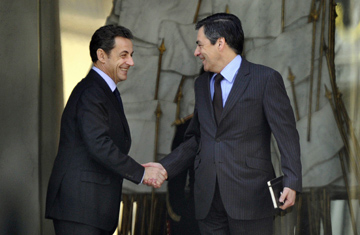
French President Nicolas Sarkozy, left, and Prime Minister François Fillon shake hands at the Élysée Palace in Paris on March 22, 2010, after a meeting to discuss the consequences of the ruling center-right party's losses in regional elections over the weekend
A few years is an eternity in politics, as French President Nicolas Sarkozy discovered on March 21 when his conservative party was trounced in regional elections. The loss was a stunning reversal of the 2007 polls that propelled Sarkozy to the Elysée and gave conservatives large majorities in both houses of parliament. Sarkozy now has two years before the next presidential election to halt a resurgent left and win back disgruntled supporters.
Final results from the second round of voting handed a coalition of leftist parties — headed by Socialists and green groups — control of 21 of France's 22 regions. The eastern region of Alsace was the only one captured by Sarkozy's Union for a Popular Movement (UMP). The cumulative national tally saw the left win nearly 54% of the vote, compared to just 35% for the UMP.
Leftists described the election and its result as a referendum on the right's national leadership — a claim difficult for Sarkozy's government to deny, given that 20 Cabinet members (including eight full ministers) who ran in the polls were roundly defeated. "The President of the Republic, the government and its majority must take into account this thrashing defeat and recognize their failure," said 2007 Socialist presidential candidate Ségolène Royal, who triumphed in the Poitou-Charentes region. "The French people have spoken, and I believe they must be heard," echoed Socialist Party leader Martine Aubry. "Hearing the French people tonight means a profound change in policies."
Will the notoriously hard-charging Sarkozy roll back his reformist drive in the wake of the electoral shellacking? Maybe a bit — especially after his quixotic insistence that the conservatives could win the second round even after the disastrous results of the first round on March 14. Rather than tweak the right's message, Sarkozy focused on a get-out-the-vote push to urge conservatives to go to the polls, a move that helped to slightly increase voter turnout but failed to prevent the left's landslide win. Now Sarkozy may have to accept a change of tactics. Says Stéphane Rozès, president of the Paris-based Cap political consultancy: "The question [voters are] asking isn't about whether conservative policies and reform in France is what they want — they're wondering if Sarkozy is capable of applying those [policies] responsibly and effectively."
Those doubts are likely to exacerbate what Rozès calls "the real leadership crisis" on the right — a split between Sarkozy and conservative legislators who have publicly challenged the President's moves over the past year and increasingly see him as ideologically inconsistent. The biggest complaint has been Sarkozy's "opening" policy of extending Cabinet positions and élite administrative appointments to officials on the left. The President says he is trying to take a bipartisan approach, but right-wingers grouse that he is giving opponents spots they want for themselves. Conservatives have also resisted Sarkozy's ecology-minded tax on carbon emissions and his radical reform of local governing bodies.
Many on the right also joined leftists in criticizing Sarkozy's national debate on French identity. Detractors said it cast immigrants, ethnic minorities and Muslims as threats. The UMP had hoped to pick up extreme-right voters by co-opting some of the traditional themes of the extremist National Front (FN) party. But the debate only seemed to help the moribund FN bounce back; it took 17% of the second round vote in the 12 regions in which it qualified.
Conservatives blame Sarkozy for their resounding defeat. Some right-wing officials now insist it's time the President abandons his mix-and-match policy decisions and return to basics. "This is a real defeat for us, and it carries a message we have to retain: we must go back to the fundamentals," says Jean-François Copé, president of the UMP's parliamentary group. "Those are what got Nicolas Sarkozy elected in 2007."
Sarkozy's initial response was a cosmetic Cabinet reshuffle, shelving of the carbon tax and a promise of more reforms — albeit only those conservatives support. What he didn't do was admit he'd made mistakes and pledge to be more attentive to criticism. He might have to.
